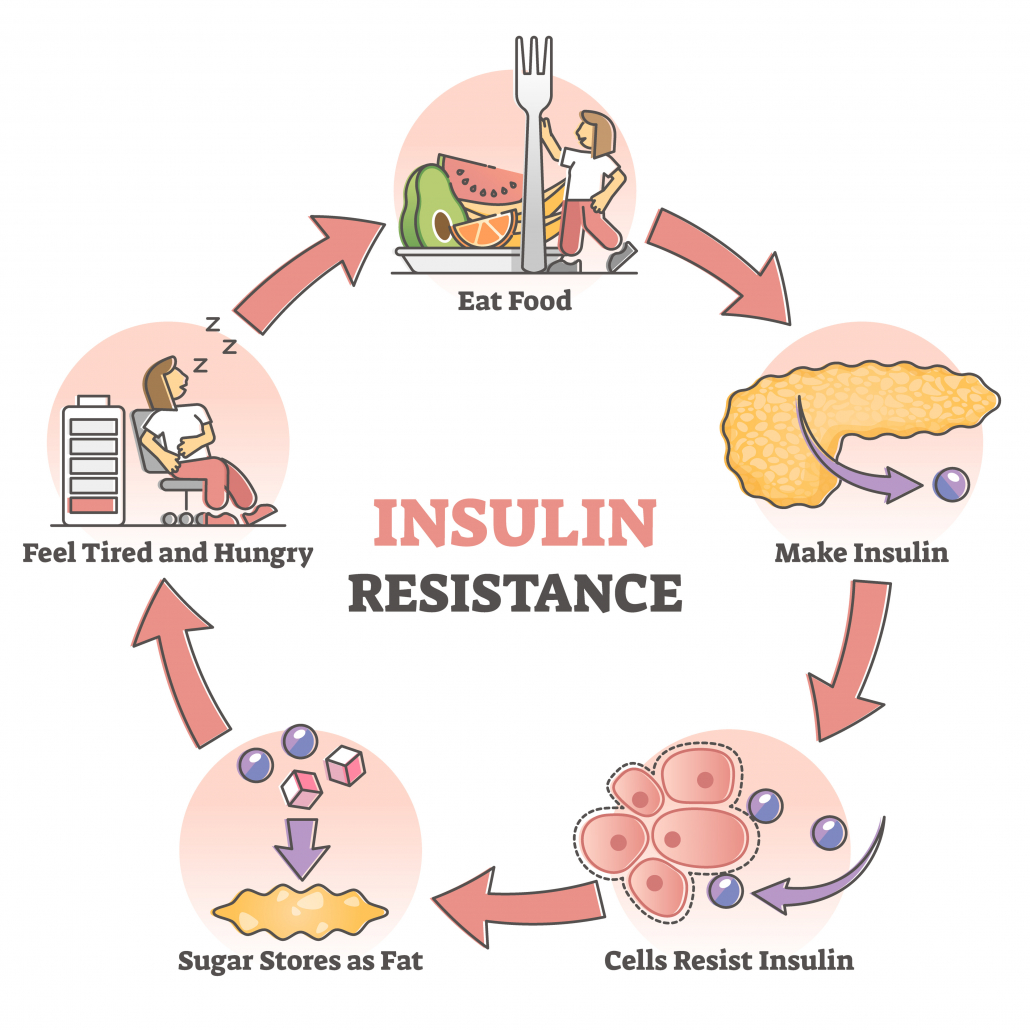We include products in articles we think are useful for our readers. If you buy products or services through links on our website, we may earn a small commission.
Insulin Resistance and Infertility: What you Need to Know

Table of Contents
When you hear the words insulin resistance, you probably think of diabetes. But insulin resistance also plays a role in the development of many other conditions including infertility.
Around 12% of women have difficulty getting pregnant or carrying a pregnancy to term. Treating insulin resistance may be the answer to solving many of these fertility problems.
This article will discuss what insulin resistance is, and how it can contribute to infertility. We’ll also explore potential causes and risk factors for infertility. We’ll then outline two of the more common infertility diseases that women experience. Lastly, we’ll discuss how to reduce insulin resistance and improve fertility by making diet and lifestyle changes.
What Is Insulin Resistance?
Insulin resistance is a condition that occurs when your cells become resistant to the hormone insulin. Insulin controls the level of sugar in the blood (glucose). When insulin is unable to do its job, blood sugar increases to unsafe levels.
In a healthy individual, insulin regulates blood sugar through the following process:
- Blood sugar enters the bloodstream after carbohydrates from food is broken down, which causes the pancreas to release insulin
- Insulin moves blood sugar into cells to provide energy
- Insulin signals the liver to store blood sugar
- The levels of sugar in the bloodstream decrease when blood sugar enters cells, which causes insulin levels to decrease as well
- The liver releases stored blood sugar to provide energy when food is not available
Insulin resistance occurs when your body is unable to properly regulate insulin. This results in the following process:
- Large amounts of blood sugar enter and remain in the bloodstream
- The pancreas releases large amounts of insulin to move blood sugar into cells
- Cells become resistant to insulin and require higher amounts of insulin to force blood sugar into enter cells
- The pancreas continues to release insulin due to high levels of sugar in the blood, which causes blood sugar levels to rise
- Insulin producing cells in the pancreas get burned out, limiting your ability to make insulin in the future

Symptoms of Insulin Resistance
Insulin resistance can cause a variety of symptoms. But often, it goes unnoticed until you’re diagnosed with a medical condition.
Symptoms of insulin resistance may include:
- Acne
- Fatigue
- Depression
- Excessive hair growth
- Increased skin pigmentation in the armpit and neck
- Obesity
- Increased urge to eat sweets
How to Diagnose Insulin Resistance
Insulin resistance can be diagnosed by a clinical exam and diagnostic testing.
Blood tests that can diagnose insulin resistance include:
- Fasting glucose test. This measures your blood sugar after fasting overnight. Blood sugar levels above 100mg/dL or more are higher than normal.
- A1C test. This test measures your average blood sugar level over the last three months. An A1C of 5.7% or more is higher than normal.
- Fasting insulin test. This test measures your insulin levels. If they are too high, it may indicate that you have insulin resistance.
- How Is Insulin Resistance Linked to Infertility?
Insulin resistance can contribute to infertility through a combination of factors including:
- Obesity
- Inflammation
- Hormone imbalances
While the exact cause of infertility is unknown, the above factors play an important role.
When blood sugar levels become too high, fat cells in the body store blood sugar as body fat. This can result in weight gain. High blood sugar also causes your immune system to produce an inflammatory response.
Moreover, fluctuating blood sugar levels can disrupt your entire endocrine system, which causes imbalances in the following reproductive hormones:
- Testosterone
- Estrogen
- Progesterone
Increasing testosterone levels in men are associated with less body fat, improved insulin sensitivity, and reduced blood sugar. But when testosterone increases in women, it’s associated with negative effects including:
Estrogen and progesterone are also influenced by blood sugar levels. High estrogen levels increase insulin sensitivity by lowering blood sugar. On the other hand, low estrogen levels and high progesterone levels can lead to insulin resistance by raising blood sugar.
Obesity, inflammation, and hormone imbalances can lead to the development of infertility diseases such as:
- Endometriosis
- Adenomyosis
- Polycystic ovarian syndrome (PCOS)
- Uterine fibroids
- Unexplained infertility
What Is Infertility?
Infertility occurs when you are unable to conceive. There are two types of infertility:
- Primary infertility. This is when you are unable to become pregnant after 12 months or more of having regular unprotected sex.
- Secondary infertility. This is when you have gotten pregnant at least once before, but are now unable to conceive.
Many factors can lead to a diagnosis of infertility before 12 months of trying to get pregnant such as age, medical history, and diagnostic testing.
The following steps must take place for a woman to become pregnant:
- A woman’s body releases an egg from one of her ovaries
- A man’s sperm fertilizes the egg
- The fertilized egg travels through a Fallopian tube to the uterus
- The fertilized egg attaches to the inner lining of the uterus
Female infertility can occur when:
- A fertilized egg or embryo dies after attaching to the uterus
- The fertilized egg fails to attach to the uterus
- The eggs are unable to move from the ovaries to the womb
- The ovaries have difficulty producing eggs
Male infertility can occur as a result of:
Risk Factors for Infertility
In addition insulin resistance, there are many other factors that can also cause difficulty conceiving that need to be accounted for if you’re having difficulty conceiving.
Women’s risk factors for infertility include:
- Age
- Smoking
- Excessive alcohol use
- Extreme weight gain or loss
- Elevated stress levels
- Physical
- Emotional
Men’s risk factors for infertility include:
- Age
- Obesity
- Smoking
- Alcohol use
- Exposure to testosterone
- Exposure to radiation
- Exposure to high heat
- Medications
- Flutamide
- Cyproterone
- Bicalutamide
- Spironolactone
- Ketoconazole
- Cimetidine
- Exposure to environmental toxins
- Pesticides
- Lead
- Cadmium
- Mercury [8]
Common Fertility Disorders in Women
Diseases such as Polycystic Ovarian syndrome (PCOS) and endometriosis are common in women with fertility problems. We’ll discuss these diseases in detail below.
Polycystic Ovary Syndrome (PCOS)
Polycystic ovary syndrome (PCOS) is a condition that causes the ovaries to develop cysts, which results in the irregular release of eggs. PCOS affects 8-18% of women of reproductive age.
This condition occurs due to an influx of androgens, which are male hormones such as testosterone. When a woman experiences elevated levels of male hormones, uncomfortable side effects can occur.
Symptoms of PCOS include:
- Acne
- Irregular periods
- Male pattern baldness
- Excess facial and body hair (hirsutism)
- Infrequent menstruation (oligomenorrhea)
- Loss of menstruation (amenorrhoea)
- Infertility
Women with PCOS are at an increased risk of medical complications including:
- Insulin resistance
- Cardiovascular disease
- Type 2 diabetes
- Depression
- Eating disorders
- Anxiety
Unfortunately, there’s no cure for PCOS. But you can treat symptoms of this disease with medication and with diet and lifestyle changes.
Endometriosis
Endometriosis is a fertility disease that occurs due to elevated estrogen levels. This disease occurs in 6-10% of women of reproductive age. Endometriosis causes cells similar to those that make up your uterine lining (endometrium) to grow in other places in your body such as:
- Ovaries
- Fallopian tubes
- Pelvic ligaments
- Bowel
- Bladder
These cells go through the same monthly hormone cycles as your uterine lining. This means they shed and bleed each time you get your period.
Symptoms of endometriosis may include:
- Pelvic pain
- Pneumothorax occurring with menstruation
- Heavy, painful periods
- Nausea
- Vomiting
- Migraines
- Body aches
- Fatigue
- Pain during sex
- Urination and bowel problems
- Infertility
Unfortunately, endometriosis increases the risk of:
How to Reduce Insulin Resistance and Improve Fertility
Making diet and lifestyle changes are key to reducing insulin resistance and improving fertility in both men and women. Below, we’ll discuss natural fertility treatments that can improve your ability to conceive.
Eat a High-Fat, Low-Carb Diet
Eating a high-fat, low-carb diet known as a keto diet can be the first step to increasing fertility. A keto diet involves consuming 70-80% of your calories from fat and minimizing your carb intake to less than 50 grams per day. If you reduce your carb intake even more, you will increase ketone levels and reduce body fat and inflammation.
By avoiding carb-heavy foods, your bloodstream does not encounter high levels of sugar. This balances your endocrine system and prevents your body from producing excessive levels of insulin. A keto diet also reduces inflammation by limiting the consumption of plant toxins.
Keto can be intimidating for vegetarians and vegans. To help you get the many benefits of low-carb high-fat living, we’ve created an in-depth vegetarian keto guide here, and a vegan keto guide here.
Keto-friendly foods include:
- Fresh meat
- Organ meats
- Fish
- Full-fat dairy products
- Yogurt
- Cheese
- Ice cream
- Eggs
- Natural fats
- Butter
- Olive oil
- Tallow
- Low carb vegetables
- Spinach
- Bell peppers
- Broccoli
- Asparagus
- Avocados
- Green beans
Remarkably, a high fat, low carb diet can improve fertility in women by:
- Enhancing menstrual cyclicity
- Improving ovulation rates
- Improving the frequency of menstruation
- Improving pregnancy rates
- Reducing circulating insulin levels
- Improving hormonal imbalance
Reducing insulin resistance in men may also improve fertility by improving semen quality.
Exercise Daily
Daily low-impact exercises like yoga, walking, and swimming can reduce insulin resistance by improving your body’s ability to absorb sugar. Building muscle mass triggers the body to convert sugar from the blood into glycogen–a type of sugar stored in your muscles to be used for energy. This leads to an improved ability to stabilize your blood sugar levels with less insulin.
Aerobic training can also improve insulin sensitivity by facilitating weight loss and reducing stress.
A note of warning: Excessive physical stress can actually contribute to infertility. If you want to get pregnant, make sure to practice low-impact exercises to reduce physical stress and improve your chances of conceiving.
Reduce Stress Levels
When you experience stress, your body produces stress hormones like cortisol. Stress hormones increase blood sugar levels, which results in an increase in insulin.
You can lower blood sugar levels by reducing stress through mind and body techniques such as:
- Deep breathing
- Yoga
- Meditation
- Practice gratitude
- Progressive muscle relaxation
- Journaling
- Personal therapy
Research shows that reducing stress is a major factor in improving pregnancy rates.
Get Quality Sleep
Poor sleep can increase your risk of the following conditions:
- Obesity
- Insulin resistance
- Type 2 diabetes
All of these factors can result in fertility problems. Improving the quality of your sleep can increase fertility by:
If you’re having trouble sleeping these 8 bedtime yoga poses can help!
Drink Plenty of Water
Water is essential for optimal health. And it plays an important role in fertility by:
- Transporting hormones to different parts of the body
- Clearing harmful toxins from the body
- Carrying essential nutrients to reproductive organs
A good rule of thumb is to drink enough water so that your urine appears light yellow or clear. This is a sign that you are properly hydrated. If your urine becomes dark yellow or orange, it’s a sign that you need to drink more water.
Practice Intermittent Fasting
Intermittent fasting involves fasting for a set number of hours and eating only within a certain window. For example, you can fast overnight and resume eating at lunch. This allows you to reduce your caloric intake. And if you fast for 12 hours or more, your body begins burning fat for fuel.
Intermittent fasting can improve fertility by:
- Stimulating weight loss
- Improving insulin sensitivity
- Reducing inflammation
Women’s bodies may require specific approaches to intermittent fasting which you can find here.
Maintain a Healthy Weight
Severe thinness or obesity can increase the risk of infertility in women. Obesity is associated with:
- Decreased pregnancy rates
- Higher miscarriage events
- Increased requirements for sex hormones
- Adverse pregnancy outcomes
- Gestational diabetes
- Hypertension
- Premature labor
Excess body fat results in the secretion of pro-inflammatory hormones, which can negatively affect reproduction. In most cases, weight loss can restore fertility in women who are overweight.
Weight loss can improve pregnancy rates by:
- Regulating menstrual cycles
- Increasing ovulation
- Restoring hormone balance
Research shows that a loss of 5-10% of body weight can significantly improve fertility.
Take Natural Supplements
Natural supplements may improve hormone regulation and reduce insulin resistance and inflammation. Beneficial supplements include:
- Cinnamon
- Apple cider vinegar
- Magnesium
- Zinc
- Inositol
- Vitamin B9
- Vitamin D
We recommend consulting with your fertility doctor before making changes to your diet.
Insulin Resistance and Infertility: The Outlook
Insulin resistance is an increasing problem that can contribute to infertility by causing:
- Obesity
- Inflammation
- Hormone imbalances
Signs that you may have difficulty getting pregnant include:
- Irregular periods or no menstrual periods
- Very painful periods
- PCOS
- Endometriosis
- Pelvic inflammatory disease
- Personal history of more than one miscarriage
- Suspected male factor (personal history of testicular trauma, hernia surgery, chemotherapy)
The good news is that insulin resistance and infertility are treatable. You can reduce insulin resistance and improve fertility by making diet and lifestyle changes such as:
- Eating a keto diet
- Getting daily exercise
- Reducing stress levels
- Getting quality sleep
- Drinking plenty of water
- Intermittent fasting
- Maintaining a healthy weight
- Taking natural supplements
You can learn more about eating a high-fat, low-carb diet to improve fertility here.
















